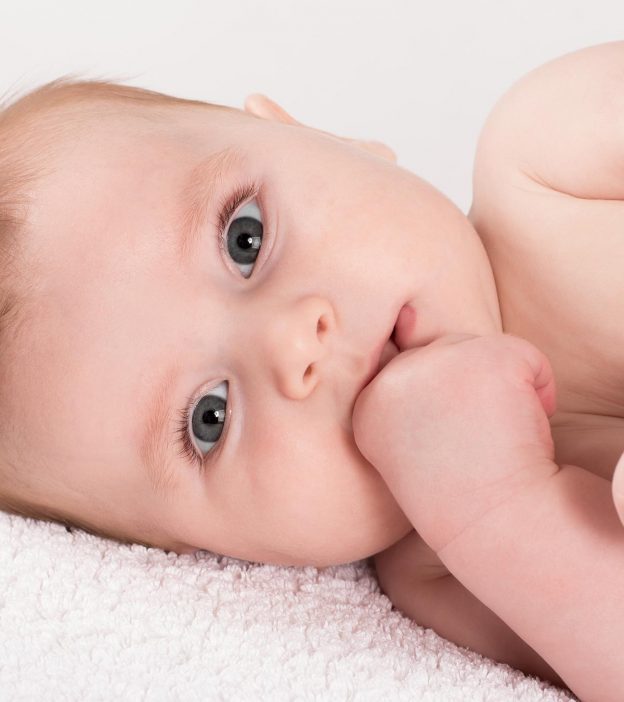Baby Puts Hands in Mouth After Feeding

Image: Shutterstock
Babies suck their hands to communicate and self-soothe. A baby sucking hand is considered a normal part of their development and may begin at two months. Besides sucking hands, you may notice babies sucking fists or even trying to put their feet in their mouths.
Most babies stop sucking their hands by themselves at around two to four years. However, if a child sucks their hands even in their kindergarten years, consult a pediatrician because hand sucking could interfere with secondary or permanent teething.
Keep reading to know why babies suck their hands, its risks, and effective ways to help babies outgrow it.
Reasons For Hand Sucking In Babies
Various reasons may make a baby suck their hands. You may have to observe your baby in detail to identify the cause of hand sucking.
Common reasons may include (1):
1. Hunger
Babies may suck hands when they are hungry. Hand sucking may indicate feeding time. Since babies suck a nipple to get milk or formula, it is normal for them to think that sucking may give them food.
Babies may suck hands even when they are full as it is a normal reflex until three months of age. Therefore, you can also look for other hunger cues, such as lip-smacking, opening and closing of mouth, and fussiness.
2. Teething
Teething may cause irritation and pain in babies. Rubbing something against the gums may soothe them, and, thus, babies may suck hands to relieve sore gums. Teething may begin between the ages of six and ten months (2).
Babies can become fussy, cry, and often drool when teething. You may also notice that they try to suck or chew other objects during this phase.
3. Self regulation or self soothing
Babies may suck hands to self-soothe from as early as the age of two months (3). Babies may suck their hands when they feel stressed, such as when around strangers or when separated from parents for some time. If they do so, then hand sucking is a self-soothing method. They may feel calm and relaxed while sucking their hands.
4. Boredom
As babies grow, they like to stay engaged with toys or caretakers for extended periods. When they have nothing to keep them occupied, they may resort to sucking hands out of boredom. Sometimes, if you keep them in their play yard or with a toy, they may begin sucking their hands to cue that they are bored and need something new.
5. Entertainment
Babies may become fascinated with their hands when they are two or three months old. They may think that it is a fantastic tool, which can be controlled by self. So, they may begin to explore the hand. The sense of sucking at the hands can be entertaining for many babies, and they tend to do it often without any apparent reasons.
Always look for reasons why your baby is sucking their hands. It is challenging to control thumb or hand sucking in later ages if it becomes habitual. You can offer them pacifiers to control this behavior. Teethers can be more convenient since you can handle it.
Risks Of Hand Sucking In Babies
Hand sucking usually does not cause any serious problems for babies. However, it is essential to ensure that their hands are clean. Babies who crawl or walk are likely to touch multiple surfaces causing germs to settle on their hands. Therefore, keep the baby's hands clean and also the surfaces or toys that they touch often.
According to the American Dental Association (ADA), hand or thumb sucking does not cause oral development problems during the first few years of life. Hand sucking beyond the age of four may damage permanent teeth. You may seek a pediatrician's advice to stop the thumb or hand sucking habit of a preschooler (4).
How To Deal With Hand Sucking In Babies?
There is usually no action needed for hand sucking in babies unless it is a hunger cue. If it is due to teething and your baby has gum swelling or fever, seek pediatrician's advice. You can also see a pediatrician if the child continues to suck their hands or thumb beyond the age of four years.
Parents can observe some steps to make hand sucking safer and provide some alternatives to babies (5) (6).
- Baby proof the house if your baby begins to crawl or walk. You may have to keep all dangerous objects out of the baby's reach since hand sucking babies often try to mouth other things, too.
- You may introduce new toys, such as crunchy stuffies and sensory toys, that may distract the baby from sucking their hands.
- If your baby is teething, give them teething toys, a cold washcloth, or a frozen feeder to suck. It may reduce pain and irritation.
- You may offer them a pacifier when they begin to suck hands. Choose the safer one-piece pacifier that does not disintegrate into multiple parts. Do not let the child use the pacifier beyond the age of four years.
If a newborn baby is sucking hands even after feeding, check if the baby is getting adequate breast milk or formula. A pediatrician or lactation consultant can help in such situations.
1. Should I let my baby put their hands in their mouth?
Babies may suck on their hands as an act of self-soothing. There is nothing wrong with it, as they may soon grow out of the habit. But the risks arise when a baby places a dirty hand in their mouth. Hence, ensure that the baby's hands and the environment are clean. Nevertheless, inform your pediatrician if you notice your baby showing other signs of discomfort when putting their hands in their mouth.
2. When should newborns stop sucking their hands?
Babies go through a phase of sucking on their fingers and thumbs. They usually get over the habit between two to four years (7). However, if your baby is teething, it is recommended to prevent them from sucking their hands with the help of a pediatrician.
3. Is it okay if a newborn sucks their thumbs?
Yes, it is okay for newborns to suck their thumbs. It is a common act among infants which usually disappears as the baby grows older (8).
Babies sucking their hands or fingers is a normal part of their development, and they will eventually outgrow the habit. Your baby may suck their hands due to various reasons, such as teething, hunger, boredom, self-soothing, or entertainment. However, ensure you keep dangerous objects out of their reach and their hands are clean. Also, providing them with new toys, washcloths, pacifiers, or frozen feeders will help divert them from hand sucking. If you notice your baby sucking hands or their thumb beyond four years of age, consult your pediatrician.
Sucking on hands and fingers is part of a baby's normal development, and they outgrow the habit. If you suspect hand sucking is due to teething or hunger, check for any hunger- or teething-related cues. Place dangerous objects out of baby's reach and keep their hands clean. If your baby continues with hand sucking even beyond the age of four years, do not hesitate to consult a pediatrician.
Key Pointers
- Babies may suck their hands for various reasons such as hunger, boredom, or self-soothing.
- Hand sucking is not associated with any health risk if the hands are clean.
- You may offer a pacifier to babies younger than four years to prevent hand sucking.
References:
MomJunction's articles are written after analyzing the research works of expert authors and institutions. Our references consist of resources established by authorities in their respective fields. You can learn more about the authenticity of the information we present in our editorial policy.
Was this article helpful?
The following two tabs change content below.
- Reviewer
- Author

Dr. Bisny T. Joseph is a Georgian Board-certified physician. She has completed her professional graduate degree as a medical doctor from Tbilisi State Medical University, Georgia. She has 3+ years of experience in various sectors of medical affairs as a physician, medical reviewer, medical writer, health coach, and Q&A expert. Her interest in digital medical education and patient education made... more

Dr. Anuradha Bansal is a pediatrician and neonatologist working as assistant professor in the Department of Paediatrics at PIMS Jalandhar. She has done her MBBS and MD Pediatrics at GMCH, Chandigarh. Thereafter, she polished her skills as senior resident at MAMC, Delhi. She has also done IAP Fellowship in Neonatology at GMCH, Chandigarh and obtained the membership of the prestigious... more
Source: https://www.momjunction.com/articles/baby-sucking-fingers-puts-hand-in-mouth_00664644/
0 Response to "Baby Puts Hands in Mouth After Feeding"
Post a Comment